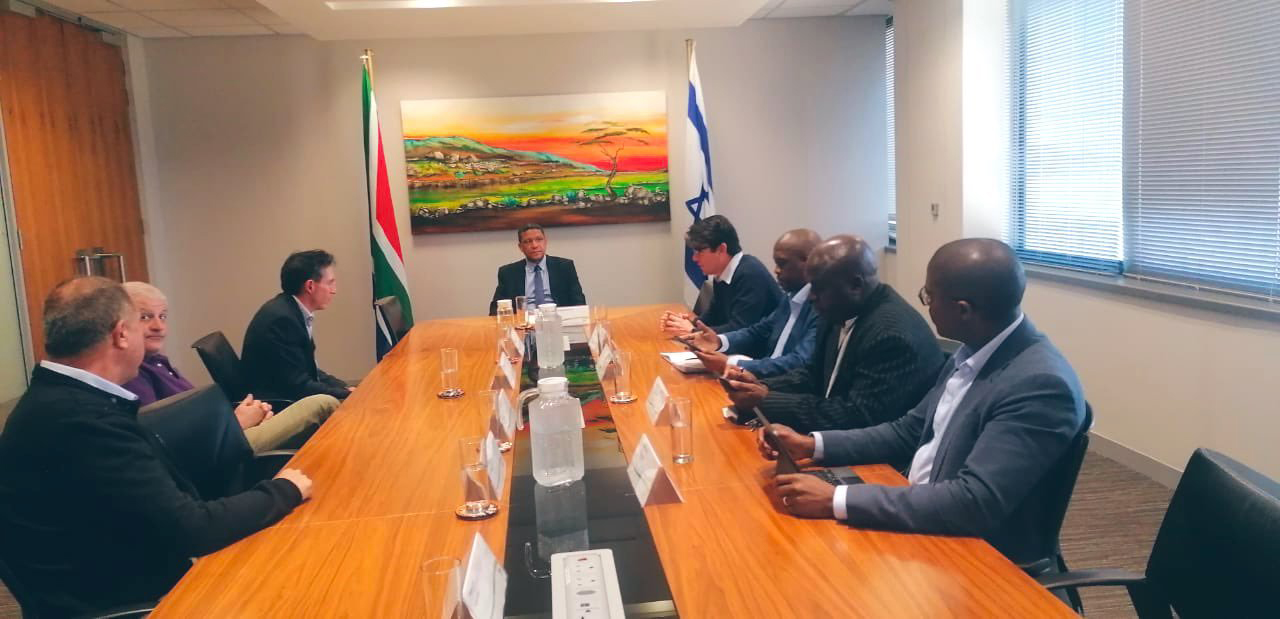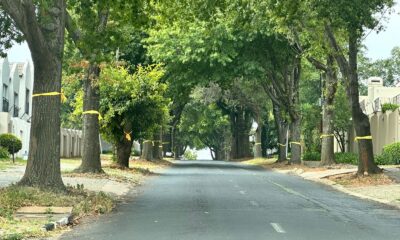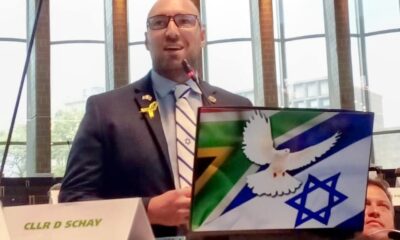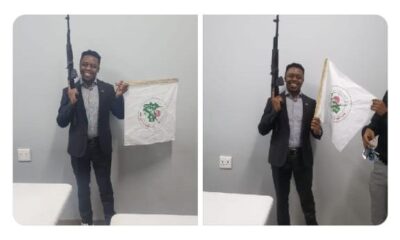
News

Tshwane to use Israeli water expertise – Jozi may follow
Published
2 years agoon
A delegation of Israeli water experts have arrived in South Africa to help the Tshwane municipality solve its water issues, and Johannesburg may follow Tshwane’s lead in calling on Israel for help.
Confirming the delegation’s visit, Tshwane Executive Mayor Randall Williams said, “Israeli academics [such as Dr Clive Lipchin, the South African-born Israel-based director of the Arava Institute’s Centre for Transboundary Water Management] are here in South Africa and will consult with us, discussing crucial issues affecting wastewater infrastructure and how we can leverage their expertise.”
South African Zionist Federation (SAZF) National Chairperson Rowan Polovin says Israel has much to offer as a world leader in water technology.
“This co-operation between South Africa and Israel is a welcome step forward for our country towards mitigating its serious water crisis. We hope other municipalities will follow suit,” Polovin says.
“This delegation offers an important opportunity for South Africa and Israel to work together to help solve these issues. The team will conduct site visits with officials from our Tshwane municipality, culminating in recommendations to improve the capital city’s water management.”
The mayor agrees that it’s an “important opportunity for South Africa and Israel to work together in solving these issues”. He said that, “The City of Tshwane looks forward to the delegation’s findings. As a municipality, we’re committed to using leading international expertise to improve the lives of our residents.”.
The initiative, funded by Jewish National Fund of South Africa (JNF SA), followed a recent meeting held between the City of Tshwane, JNF SA, and the Israeli ambassador to South Africa, Eli Belotsercovsky.
Benji Shulman, SAZF director of public policy, says that according to comments from the Johannesburg city officials, “Johannesburg is already involved in looking more seriously at Israeli technology”.
The reason for engagement with Tshwane was twofold, Shulman says. First, the election of a new mayor at a similar time to the arrival of a new Israeli ambassador was fortuitous, heralding the possibility of new interactions.
Second, “Tshwane is governed by a coalition that doesn’t include the ANC [African National Congress] and EFF [Economic Freedom Fighters]. The mayor is a practical man, and sees why this is needed. It’s an important signal – and a glimpse of the future – that politicians and the people are tired of the politics around Israel and South Africa. They want service delivery, and will take it from the best people who can help. The people are putting themselves first and fixing their own problems. Israel can be part of that solution.”
Shulman says there has also been interest from the Free State, KwaZulu-Natal, and the Western Cape. “Water is an issue everywhere. Most people just want to move forward. It’s positive all round.”
He says in Tshwane, the issues that have arisen aren’t all over the system. The main problem is wastewater treatment. That’s why they specifically brought out Lipchin as a wastewater expert.
The visit took six months to plan, including engaging with city officials on the ground about their needs. “There’s no Israeli silver bullet in the face of decades of neglect,” says Shulman. “However, Israel can help manage the problem and lessen the load on the plant, giving the municipality breathing space.”
South Africa, like Israel, is a water-stressed country relying on rainfall. “If Johannesburg has a drought for one or two years, we can go the same route as Cape Town and have a Day Zero,” said Etienne Hugo, general manager operations at Johannesburg Water. Some municipalities are already heading towards Day Zero, when municipal water is no longer available. Nelson Mandela Bay has already reached this point.
Hugo was speaking during a discussion about Johannesburg’s water crisis at the Rabbi Cyril Harris Community Centre in Houghton on 11 August. Lipchin and Democratic Alliance City Councillor Daniel Schay participated in the discussion.
Following the Tshwane municipality’s move to enlist Israelis to help with its water problems, Hugo said it was possible that Johannesburg could do the same thing.
“There’s always the need to explore other countries’ expertise, especially if they have implemented projects or technologies successfully which we might identify a need for. Within the Municipal Finance Management Act, there should be room to take on this offer of help.”
He said the City of Johannesburg would be interested in expertise and technology, whether from Israel or another country, “to treat the effluent not only to irrigation standards but to potable stage”.
He spoke about the urgent need to replace the city’s ageing water infrastructure, and said the challenge was funding, or the lack thereof. “Therefore, we prioritise areas to make sure problematic areas can be targeted first.”
Currently, the City of Johannesburg is replacing 100km to 120km of pipe a year, predominantly asbestos pipe, Hugo said. “Since the late 1980s, the City of Joburg has been reducing infrastructure replacement because of financing not always being available. Therefore, you push your asset to the limit, but you can also push it over the edge.”
South Africa must ensure it improves its infrastructure – whether it be reservoirs, reticulation systems, or pumping stations – in tandem with its energy supply, said Lipchin. “If you don’t have reliable and stable energy, you’re always going to run into problems. It puts strain on infrastructure. If your energy goes down, the pressure on your pipes will change, exacerbating leakages.”
The City of Johannesburg aims to start looking at effluent reuse (basically recycling water) and alternative water resources such as groundwater and boreholes, said Hugo. “We’re working quite hard on our Water Conservation Water Demand Management Masterplan, a five-year plan to limit water losses, so even if there’s a drought, we can sustain it. The city is busy with an approval process for our drought management plan, which is more or less based on what the City of Cape Town did.”
Israel is a world leader in recycling wastewater, said moderator Michael Kransdorff, the JNF SA chairperson who facilitated the discussion.
“Wastewater treatment and reusing effluent is something everybody has to begin to internalise,” Lipchin said. “I don’t think anyone can continue to manage and provide water without factoring in the water supply budget and alternative water sources. Israel has the technology to do that. We’re irrigating more than 60% of our crops. This frees up freshwater for domestic use. The biggest challenge for water quality is to provide water for human consumption. Of course, freshwater will always be the most preferable water resource.”
Through effective wastewater treatment, Israel has lessened its dependency on freshwater, Lipchin said. “This enables us to override drought. If we look at the long-term hydrological models for our region, droughts are going to get longer and the impacts greater because of climate change and population growth.”











yitzchak
Aug 18, 2022 at 2:36 pm
This is a far cry from the Breaking of ties between the University of Johannesburg and Ben Gurion University in water studies in 2011 when UJ under Adam Habib of the “N” word fame with Cosatu .D Tutu. and others voted in favour of the boycott.
Good luck! Israel has so much to offer.
One thing I don’t understand is if our best fruit and vegetables come from Hartebeestport dam which is the cesspool effluent (from the affluent) why treat it? It’s a natural source of fertilizer.
The Vaal Dam (Die Vuildam) as our main water resource in JHB is seriously in need of care to stop pollutants.